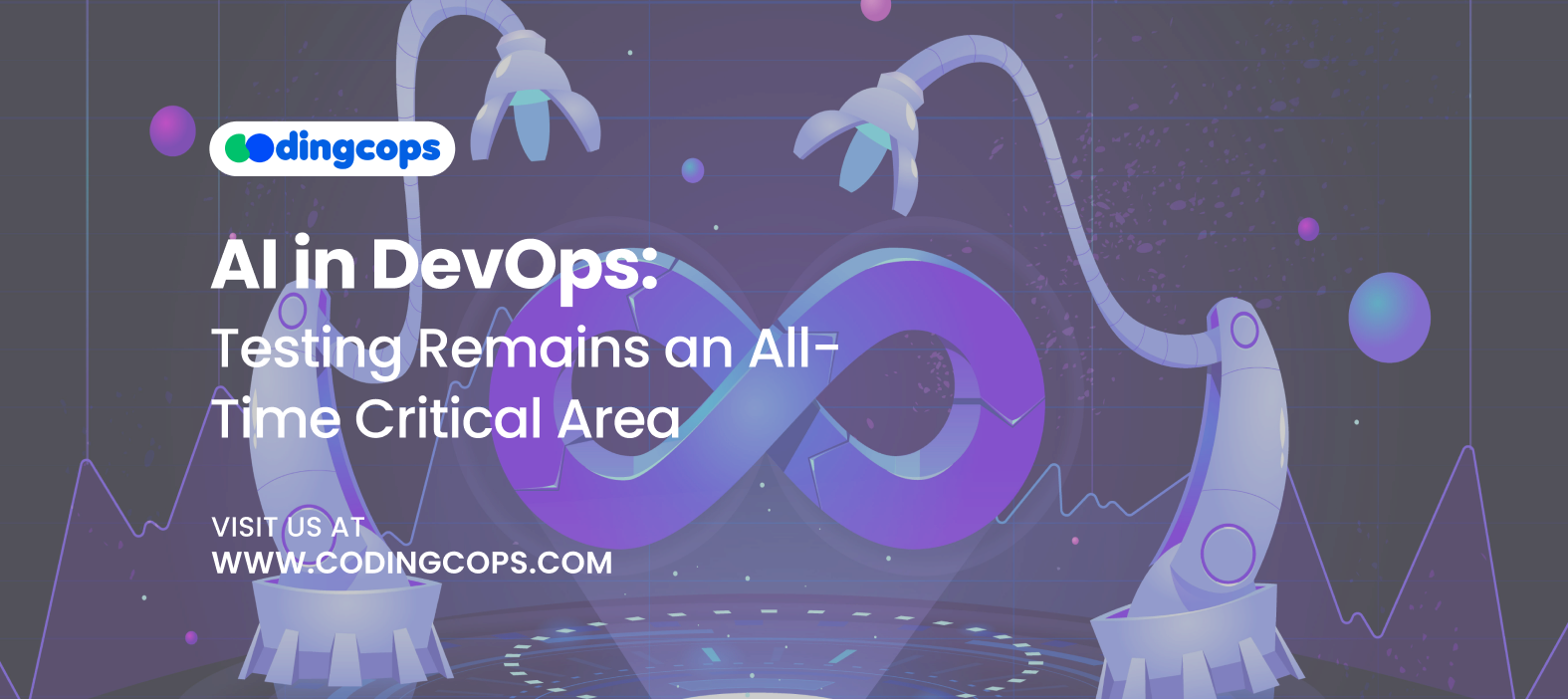Are you a DevOps engineer? Do you face difficulty in testing or want to enhance the testing process in software development? Please go through today’s article, as it is only about DevOps, testing, and how testing can be made better.
Since DevOps’s inception, it has become a lot easier to deliver faster, more reliable, and continuous software releases. Over time, when the demand for speed and scalability rose, AI stepped in as the savior and optimized DevOps practices to the next level.
However, despite many innovations, developers, and DevOps engineers still faced challenges in software testing, especially in the DevOps pipeline. At this moment, AI in DevOps assisted in the testing processes to enhance testing capabilities.
This article explores how AI assists in testing DevOps applications along with implementation areas, and the future of AI in testing.
Artificial Intelligence – A Snapshot
Artificial Intelligence (AI) is the creation of a computer system that conducts operations similar to human intelligence. Such computer systems or machines are programmed to perform, think, learn, reason, and solve problems in human behavior.
The rapid enhancement and integration of AI in various fields is gradually evolving. It is primarily because of its capacity to automate work, eliminate errors, and provide speedy and smart decisions made by analyzing data.
DevOps – A Bird’s Eye View
DevOps is a term that is a combination of development (dev) and operations (ops) and is a software development approach primarily focused on collaboration and communication between development and operations teams. Moreover, it uses agile methodologies, continuous integration and delivery, and automation to ensure a smooth development process.
In simple words, it unifies software development and IT operations, hence shortening the development lifecycle while delivering top-notch, modern software.
Why DevOps is Necessary in Modern Development
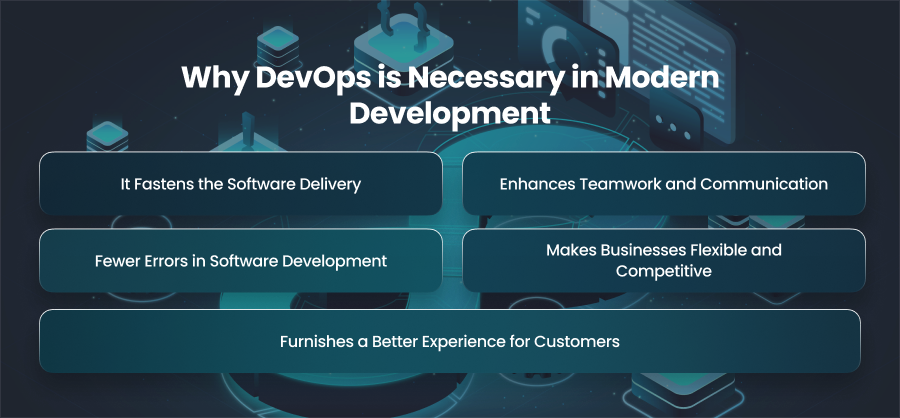
It Fastens the Software Delivery
Firstly, DevOps fastens the overall software development process and eventually delivers by automating tasks like testing and deployment. Unlike traditional development, new features, updates, and bug fixes reach users quickly rather than taking days.
Enhances Teamwork and Communication
Secondly, DevOps enhances communication and collaboration among cross-functional teams. This allows various teams to work together, share knowledge, and take responsibility for the software development process from start to finish.
Fewer Errors in Software Development
Software that is constantly monitored, tested, and upgraded assists in identifying bugs before they can actually reach the users. Consequently, there is a minimized production of bugs, and it renders the system more stable, safe, and reliable.
Furnishes a Better Experience for Customers
The one thing that validates a business or application is that its customers are happier. Since DevOps ensures fast updates, fewer bugs, and stable systems, it keeps the customers happier with an overall good experience.
Makes Businesses Flexible and Competitive
Lastly, the world has become competitive, and you need to be ahead of the pack so that you can get the best out of your business. Therefore, DevOps will enable your business to launch features fast and act on the responses. In addition, you are also able to effect more and quicker alterations and adjustments, and it is also a factor in keeping your business ahead of others and putting up with the changes promptly.
Software Testing in DevOps
The concept of software testing in DevOps is the integration of testing activities within the software development cycle to maintain continuity in quality and improvement, as well as instantaneous feedback. It does away with a traditional testing practice, which most of the time occurs after a product or application is ready.
Software testing is an important stage, and it needs to be incorporated in all stages of the software development life cycle, which helps to create feedback faster, solve problems more quickly, and release the products quicker.
Types of Testing in DevOps
- Unit Testing
- Integration Testing
- Functional Testing
- Regression Testing
- Performance Testing
How to Implement AI in DevOps
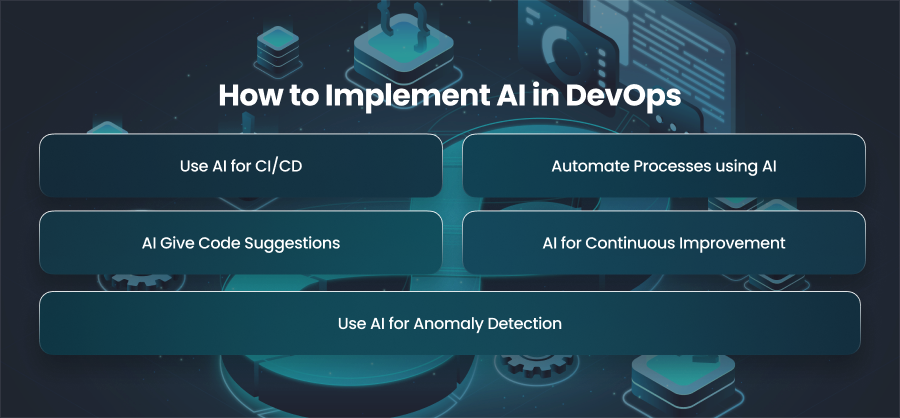
Use AI for CI/CD
Continuous integration and continuous deployment are typical AI in DevOps applications. It is easy to automate the construction, testing, and deployment of code with AI. Consequently, the modifications that occur during the application must undergo tests and subsequently be released to production setups.
AI in CI/CD minimizes errors and raises the overall performance and quality of the developing software.
Automate Processes using AI
Furhter, AI can be used in DevOps to automate the testing processes. Automation of testing processes helps organizations achieve continuous delivery.
AI can help developers automatically run tests on new code. Moreover, developers are empowered to quickly identify and fix bugs that arise in the code. This strategy makes the code ready for deployment.
AI Give Code Suggestions
Like in word processors, AI can be a helping hand while coding as it gives coding suggestions while writing code. This helps the programmers with useful suggestions and saves time.
AI for Continuous Improvement
Besides, artificial intelligence can be adopted by organizations adhering to DevOps to facilitate continuous improvement initiatives. Looking through the data of logs and performance metrics, as well as user feedback, AI can also develop patterns and trends that give insight into the areas that can be improved.
This data will be very important in subsequent development initiatives and will streamline the software delivery process later in the future.
Use AI for Anomaly Detection
Finally, but not leastly, AI is applied to identify instances of abnormalities in log records or some other data sources. By finding the anomalies, DevOps teams can discover the issues that might arise at some point in the future. These deviations are the ones that minimize downtimes and enhance the quality of products.
What Challenges Testing Faces in DevOps
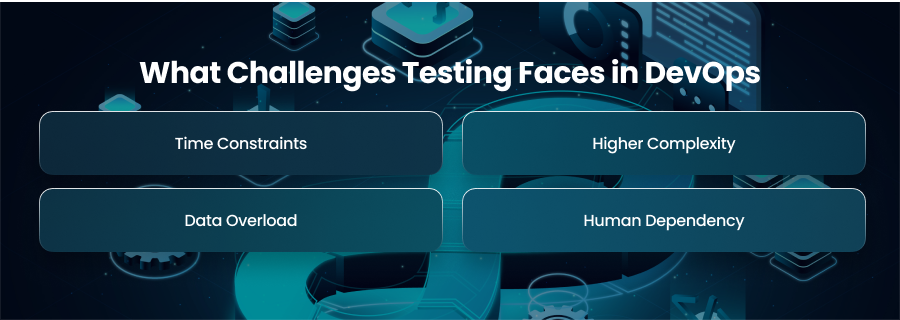
Before we dive into understanding the role of AI in DevOps, we must first understand the challenges faced by DevOps in testing. This will help you better grasp the role of AI in DevOps.
Time Constraints
Continuous delivery requires rapid testing, which manual and semi-automated testing do not keep up with at times.
Higher Complexity
Testing environments have become more complex with microservices, containerized applications, and multi-cloud structures.
Data Overload
The large amount of data generated by a complex system is a challenge to pick a pattern and predict failure within the complex system.
Human Dependency
Testing by a human or even an automated method with a script will be highly dependent on a human being, with the possibility of delay and errors.
How AI is Reshaping Testing in DevOps
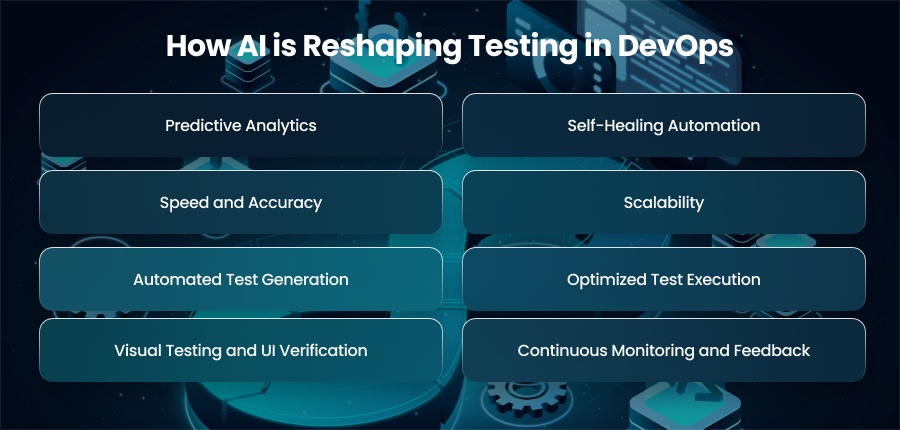
AI, when incorporated into any field, brings fruitful results. So, if we bring AI to testing, especially in DevOps, it offers a transformative approach while solving many problems.
Here’s how AI is reshaping testing in DevOps:
Predictive Analytics
When using AI, test case prioritization, defect prediction, and operations are simplified during the implementation of predictive analytics activities. In addition, it studies old data in order to find patterns, failure prediction, and testing strategy optimization.
Self-Healing Automation
AI-powered testing frameworks can intelligently detect changes in application behavior or UI and automatically adjust test scripts. This self-healing capability reduces manual updates, saving time and ensuring test continuity in dynamic software environments.
Speed and Accuracy
Deep learning-based tools quickly search large code bases, configurations, and test cases to find bugs with more precision. They substantially reduce false positives, which allows the QA team to concentrate on actual problems and improves release times.
Scalability
The AI’s ability to support and process vast volumes of data on complicated structures is matchless. AI scales easily regardless of whether you test microservices, APIs, or applications at the enterprise level, offering comprehensive coverage with no development drag.
Automated Test Generation
When AI is incorporated into DevOps testing, the AI-powered testing tools enable you to generate test cases automatically. It is done by analyzing the behavior of the application, user interactions, and historical test data.
Given this integration, test case creation becomes unnecessary in manual development, as there is improved coverage of the tests. In addition, AI-based test case generation is extra responsive during exploratory testing when no one knows what problems are present, and ought to be found and fixed.
Optimized Test Execution
Imagine running all test cases in every release cycle, what will happen? It will be a hugely time-consuming process and resource-intensive too. Thus, to prevent this kind of stuff, AI-based testing tools rank the order of the test cases considering the risk evaluation, the modification of the codes, and the past performance of the test.
Therefore the riskier test cases are run first and thus save on the time of execution and at the same time the quality of software is not affected.
Visual Testing and UI Verification
With visual testing and UI verification, things get a lot easier in identifying issues in the testing process. The AI-powered tools bring visual testing tools that compare the application’s interface screenshots in different test runs to identify even minimal UI discrepancies.
Implementing such strategies ensures that the changes in the design or UI don’t have any negative impact on the user.
Continuous Monitoring and Feedback
AI benefits your application by enhancing the continuous testing process. When AI is fed with data on application performance, security loopholes, and user behavior, it enables the AI testing system more accurate and better.
Thus, continuous monitoring of application health enables the DevOps team to identify and resolve issues at the earliest, before they impact users.
AI in Continuous Testing and DevOps – The Future
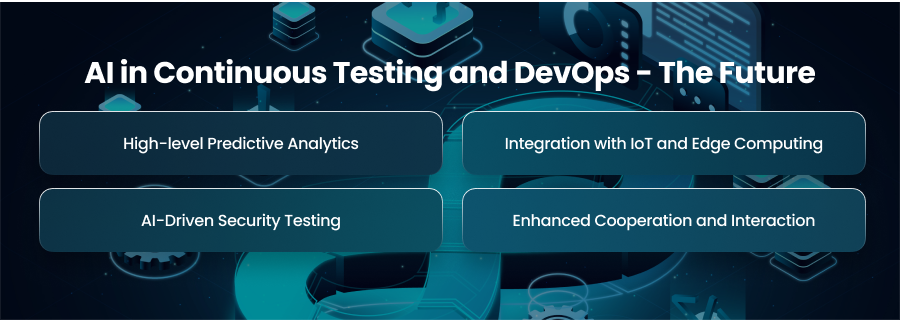
The relevance of AI to continuous testing and DevOps is only meant to increase. Here is a list of trends that need to be observed in the coming days:
High-level Predictive Analytics
In the future, predictive analytics based on AI will also be more precise and refined, as more data and more efficient algorithms will be used. This will allow identifying defects even more precisely, streamline tests, and performance monitoring.
Integration with IoT and Edge Computing
Due to the growth of the Internet of Things and edge computing, AI will be an integral part of managing and testing distributed systems. AI-based tools effectively work to meet the reliability, security, and performance requirements of IoT devices and edge applications.
AI-Driven Security Testing
Following the increasing importance of cybersecurity, AI will become important in the area of identification and mitigation of security risks. AI tool connectivity will analyze code, network traffic, and human behavior so as to detect possible threats that may lead to software security.
Enhanced Cooperation and Interaction
The future AI tools are aimed at enhancing communication and collaboration using chatbots and other advanced tools, such as virtual assistants or AI-based project management systems.
Limitations and Challenges of AI in Testing
Besides the benefits of AI in testing, certain challenges come your way that must be addressed.
Lack of Contextual Understanding
AI can analyze patterns, but it doesn’t understand intent and user psychology. For example, it may pass a test case that is technically successful but delivers a poor user experience.
Bias and Data Limitations
AI only learns from the data which is fed to it. You may say it is confined to the fed data. Hence, it has no ability to anticipate scenarios outside the data fed, making it unreliable in novel situations.
Maintenance and Scalability
AI systems and test models also need upkeep. As applications evolve, so must the AI’s training datasets and algorithms. Poorly maintained AI can introduce risks rather than mitigate them.
Summary
So, guys, this was a comprehensive guide on how AI is bringing change in testing the DevOps applications. Testing is an all-time critical area of the software development process, as it ensures the software quality, user experience, and compliance demands.
Hence, when AI is used in testing, it ensures faster, smarter, and more reliable software delivery.

